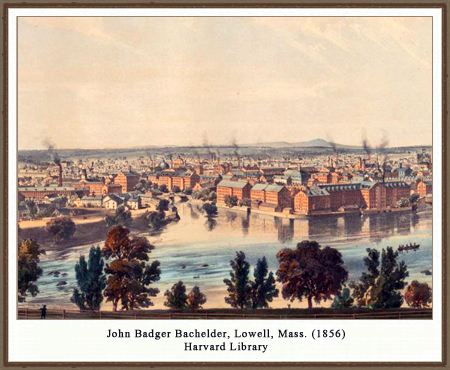
Visit the Tsongas Industrial History Center at UMass Lowell. Visit the American Textile History Museum. Visit Lowell National Park. Visit UMass Lowell. |
Lowell
In A Week on the Concord and Merrimack Rivers, published in 1849, Thoreau commented on the transformation of the region in the midst of Lowell's enormous industrial growth: "It is a rapid story the historian will have to put together. Miantonimo, — Winthrop, — Webster. Soon he comes from Montaup to Bunker Hill, from bear-skins, parched corn, bows and arrows, to tiled roofs, wheat-fields, guns and swords. Pawtucket and Wamesit, where the Indians resorted in the fishing season, are now Lowell, the city of spindles and Manchester of America, which sends its cotton cloth round the globe. Even we youthful voyagers had spent a part of our lives in the village of Chelmsford, when the present city, whose bells we heard, was its obscure north district only, and the giant weaver was not yet fairly born. So old are we; so young is it." Over a decade later, on September 9, 1860, Thoreau went to Lowell to give two talks, having agreed to lecture in the morning and the afternoon in order to maximize turnout and minimize his hosts' outlay for traveling expenses. The lectures were advertised in all the major papers, with notices describing him as "one of the most original and radical thinkers" and "a gentleman of marked ability." Although these notices and other records do not include titles, all of the available evidence suggests that Thoreau delivered "Life Misspent" and "Walking," which were both polished lectures that he had given relatively frequently in the past. We have yet to find reviews written at the time, but years later, Lowell resident Z.E. Stone vividly recalled Thoreau's remarks: "I remember very well on one occasion, some years ago, when listening to a lecture by a late Concord scholar and philosopher, to have heard a most entertaining denunciation of those who find satisfaction in reading the mere news of the day; and I was assured by the speaker, so indifferent was he to what was going on outside of himself and the things he deemed of practical value, that he would not go to the corner of the street to see the world blow up! ... To be sure the Concord man was by some people called "a child of nature," and took special delight in lying around on mother earth, indolently watching the active squirrels, the habits of fishes, and characteristics of bugs and things; and I suppose he had a right to be indifferent to what was going on in the world among his fellowmen, and to spend his time as he pleased, if he paid taxes, but he didn't—willingly. But the doubt his remark called up has ever since beset me," Z.E. Stone, "General Jackson in Lowell," Contributions to the Old Residents' Historical Association of Lowell (June, 1879), 105. View Thoreau's map of his 1839 excursion on the Concord and Merrimack Rivers. |






 When Thoreau and his older brother, John, took a trip up the
When Thoreau and his older brother, John, took a trip up the 





